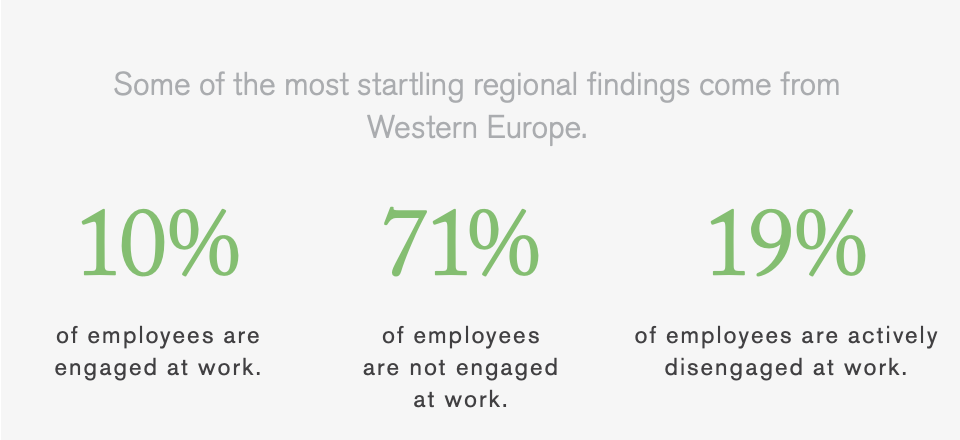
The state of the global workplace
Businesses must recognise that an organisation’s activity and capacity for organic growth is inextricably tied to the everyday experiences of its employees. – Gallup
The global aggregate from Gallup* data collected in 2014, 2015 and 2016 across 155 countries indicates that just 15% of employees worldwide are engaged in their job. Two-thirds are not engaged, and 18% are actively disengaged.
One of the most surprising differences across global regions is that the proportion of engaged employees in Western Europe – one of the world’s most economically developed regions – is even lower than the global average.
Only 10% of employed Western European are engaged at work. By comparison, the figure among U.S. employees is more than three times as high at 33%. The contrast suggests that management practices are a key factor in U.S. companies’ ongoing productivity edge over their European counterparts.
Businesses that orient performance management systems around basic human needs for psychological engagement – such as positive workplace relationships, frequent recognition, ongoing performance conversations and opportunities for personal development – get the most out of their employees.
Engaged, not engaged and disengaged employees
Engaged employees are highly involved in and enthusiastic about their work and workplace. They are psychological “owners”, drive performance and innovation, and move the organisation forward.
Not engaged employees are psychologically unattached to their work and company. Because their engagement needs are not being fully met, they are putting time – but not energy or passion – into their work.
Actively disengaged employees aren’t just unhappy at work – they are resentful that their needs aren’t being met and are acting out their unhappiness. Every day, these workers potentially undermine what their engaged co-workers accomplish.
Which one are you?

A message to employers
People feel resentful towards their employer if their needs for psychological engagement aren’t being met. These needs are different for all of us: Jo may want to receive recognition for her hard work in form of additional financial gain such a bonus vs Tim may want to reduce his hours to be able to spend more time with his young family. Being able to work more from home and reducing her hours wouldn’t satisfy Jo’s need for financial recognition, and a bonus wouldn’t satisfy Tim’s needs.
We are all different – and a responsible employer should take the time to get to know their staff and be flexible in their approach to meeting each individual’s needs. Disregarding the importance of knowing their staff, understanding their needs and being forthcoming can be costly. Not engaged or actively disengaged employees carry a hidden expense on their shoulders which can prove to be very costly for an organisation. A high-cost is also attached due to a frequent turnover of staff who tend to leave their managers rather than the jobs themselves.
Chances are that you are not happy at work
85% of employees worldwide are not engaged or are actively disengaged in their job. – Gallup
If you work just for the sake of earning a salary, chances are that you are not really happy in your job. And if it’s hard for you to go to work because of feeling resentful towards your employer, you are most likely acting out your unhappiness at work and often also in your personal life.
It’s really tough when our employer doesn’t give us what is important to us, that they are consistently inflexible and when they simply don’t listen. Over time, if our needs remain unanswered, most of us become frustrated, angry or even depressed.
Feeling these emotions has clearly an impact on how we behave and perform at work. Over time, feeling bad and behaving in a disengaged way becomes a habit. It feels easier to feel frustrated, angry, depressed and generally unhappy at work than being hopeful that things will improve. It feels easier to be a passive listener in team meetings with a tendency to criticism than to be an active contributor and feeling excited about new ideas.
Joining the ‘work happiness club’
To see progress in your environment, you need to start feeling better first.
The key to feeling better and to start seeing progress is all about breaking the habits which don’t serve us. It’s easier said than done, but you can absolutely do it! This is how:
STEP #1: Acknowledge your feelings of unhappiness. Whether it’s boredom, frustration, anger or even depression, take 5 minutes and give yourself the permission to feel everything that is coming up. This may sound counterproductive, after all you have been feeling unhappy for a while. But giving your fullest and undivided attention to what’s bothering you for 5 minutes whilst embracing all the emotions that are coming up for you authentically and honestly, will make a huge difference! It is crucial to set yourself the strong intention at the start that once the 5 minutes are over you will leave everything that is eating you up behind and focus on the positives.
STEP #2: This is the step where you need to learn how to feel better even though the conditions or environment haven’t changed yet. The most effective way to do this is to behave as if your needs were already answered. This is not easy, but it’s effective! Image – How would it make you feel if you got what is important to you at work, if you felt that your employer has finally listened? Chances are that you would feel uplifted, hopeful, excited, eager, or motivated?
Feeling positive is the first step to changing our behaviour. When we feel great we naturally act with more passion, motivation and conviction. The key here is to feel great before the external circumstances are showing to be shifting in our favour.
Each morning for at least one week, set yourself the intention to feel great at work by shifting your focus away from what’s not working towards how you want to feel when things do finally go according to plan. Spot-check on how you feel throughout the day and if it’s anything less than good, shift your focus. Once the week is over, take 10 minutes to reflect (ideally in writing) about what has changed.
STEP #3: This is essentially an extension of step #2. Keep up the great work about feeling good regardless of the circumstances. Gradually, people will start noticing the change in you. You will be perceived to be motivated, positive, keen to contribute. You will feel happy at work which will show in your behaviour.
Once you start acting differently as a result of feeling good, you will attract the right attention from your colleagues, superiors or even potential new employers if you decided to change organisations.
Wonderful things happen and unexpected doors open when we make a conscious effort to leave our disempowering and destructive habits behind by shifting our focus on what’s already working and on feeling great!
*Through analytics and advice, Gallup helps leaders unlock the full potential of individuals, teams and organisations. To download the most recent report on the State of the Global Workplace, click here.
Once you watch the video, I’d love to hear from you.
- Do you recognise yourself to be an engaged, a not engaged or an actively disengaged employee?
- If you are not engaged or actively disengaged at work, how much time do you spend in one day thinking about being unhappy at work?
- What have you already done to improve your situation?
- What habits do you have which you believe are not serving you?
- How committed are you to improving things for you?
- If you are an employer, how much time do you take to listen to what your people want and what is important to them? And speaking overall, how do you approach the different needs of your staff?
Even just a quick comment will help you to start taking your power back.
Thank you for reading, watching and adding your voice to the conversation.
Your contributions mean a lot more than you know.

APower 3 – Unlocking Human Potential. Enhancing Businesses. Mind Freedom®








The headline caught my eye, and I’m glad to have read this. Wow – who would have thought that so many of us are unhappy at work! I have been unhappy for a long time. But I’m determined to change things for me. Will defo give the suggested 3 steps a go! Thanks for your contributions.
Hi Stuart, yes, the stats are concerning! But, we can change them – one person at at time. 🙂 Let me know what changes after you make the 3 steps a priority in your life.